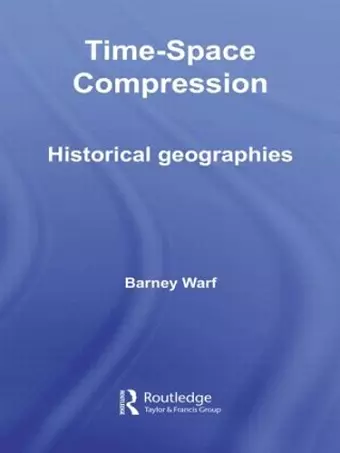Time-Space Compression
Historical Geographies
Format:Hardback
Publisher:Taylor & Francis Ltd
Published:1st Jan '08
Currently unavailable, our supplier has not provided us a restock date
This hardback is available in another edition too:
- Paperback£55.99(9781138010574)

If geography is the study of how human beings are stretched over the earth’s surface, a vital part of that process is how we know and feel about space and time. Although space and time appear as "natural" and outside of society, they are in fact social constructions; every society develops different ways of measuring, organizing, and perceiving them. Given steady increases in the volume and velocity of social transactions over space, time and space have steadily "shrunk" via the process of time-space compression. By changing the time-space prisms of daily life – how people use their times and spaces, the opportunities and constraints they face, the meanings they attach to them – time-space compression is simultaneously cultural, social, political, and psychological in nature.
This book explores how various social institutions and technologies historically generated enormous improvements in transportation and communications that produced transformative reductions in the time and cost of interactions among places, creating ever-changing geographies of centrality and peripherality. Warf invokes a global perspective on early modern, late modern, and postmodern capitalism. He makes use of data concerning travel times at various historical junctures, maps of distances between places at different historical moments, anecdotal analyses based on published accounts of people’s sense of place, examinations of cultural forms that represented space (e.g., paintings), and quotes about the culture of speed.
Warf shows how time-space compression varies under different historical and geographical conditions, indicating that it is not one, single, homogenous process but a complex, contingent, and contested one. This book will be useful book for those studying and researching Geography, History, Sociology, and Political Science, as well as Anthropology, and Philosophy.
"Warf has taken an impossibly deep and broad topic and written an excellent historical outline of the evolution of time-space compression from both a theoretical and an empirical perspective. The book is very well written, with a writing style that makes complex topics and ideas, such as tructuration theory, accessible and easy to understand. hus, this book is appropriate for a ange of readers from undergraduates to full academics."—The Canadian Geographer, Daniel H. Olsen, Brandon University
ISBN: 9780415418034
Dimensions: unknown
Weight: 544g
266 pages